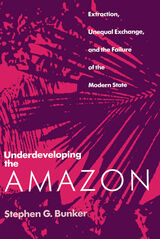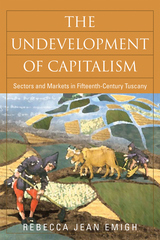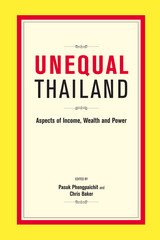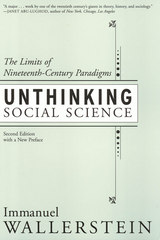338 books about Capitalism and 7
start with U
338 books about Capitalism and 7
338 books about Capitalism
7 start with U start with U
7 start with U start with U

Underdeveloping the Amazon
Extraction, Unequal Exchange, and the Failure of the Modern State
Stephen G. Bunker
University of Chicago Press, 1988
Underdeveloping the Amazon shows how different extractive economies have periodically enriched various dominant classes but progressively impoverished the entire region by disrupting both the Amazon Basin's ecology and human communities. Contending that traditional models of development based almost exclusively on the European and American experience of industrial production cannot apply to a regional economy founded on extraction, Stephen G. Bunker proposes a new model based on the use and depletion of energy values in natural resources as the key to understanding the disruptive forces at work in the Basin.
[more]

Understanding Capitalism
Critical Analysis From Karl Marx to Amartya Sen
Douglas Dowd
Pluto Press, 2002
Understanding Capitalism combines the essays of seven leading economists, including Robin Hahnel and John Bellamy Foster, in a critical assessment of the relationship between economic thought and the dominance of capitalism. With analyses of economists ranging from Karl Marx to Amartya Sen, the book traces the growth of the capitalist system over the past two hundred years and how economic theory has, in fact, become capitalist ideology. Relating socio-economic and analytical histories to present-day economic policy, this is a thoroughly accessible work which makes an ideal introduction to the key thinkers in economic thought past and present.
Major economists and economic schools of thought are discussed in a chapter-by-chapter guide that covers Marx, Veblen, Gramsci, post-Keynesian theory, US institutionalists, Sweezy and the Monopoly Capital school, and recent Nobel Prize winner Amartya Sen. Contributors include Michael Lebowitz, Carl Boggs, Michael Keaney, Frederic Lee, John Bellamy Foster and Robin Hahnel, with an introduction by the editor, Douglas Dowd.
Major economists and economic schools of thought are discussed in a chapter-by-chapter guide that covers Marx, Veblen, Gramsci, post-Keynesian theory, US institutionalists, Sweezy and the Monopoly Capital school, and recent Nobel Prize winner Amartya Sen. Contributors include Michael Lebowitz, Carl Boggs, Michael Keaney, Frederic Lee, John Bellamy Foster and Robin Hahnel, with an introduction by the editor, Douglas Dowd.
[more]

The Undevelopment of Capitalism
Sectors and Markets in Fifteenth-Century Tuscany
Rebecca Jean Emigh
Temple University Press, 2008
The results of a decade-long research study by the author, in The Undevelopment of Capitalism Rebecca Jean Emigh argues that the expansion of the Florentine economic market in the fifteenth century helped to undo the development of markets of other economies, especially the rural economy of Tuscany, paradoxically slowing down the economic development of northern Italy overall. This "undeveloping" process, as Emigh calls it, produced an advanced economy at the time of the late Middle Ages and early Renaissance, but created the conditions whereby much of this area of Europe delayed its full development into industrial capitalism by many ages, so that full-scale industrialization happened in other places first, leaving northern Italy behind.
As a lucid explanation of capitalism that turns back the clock even further on its birth, The Undevelopment of Capitalism makes a significant contribution to the studies of capitalism, historical sociology, and theories of markets as economic and cultural institutions.
As a lucid explanation of capitalism that turns back the clock even further on its birth, The Undevelopment of Capitalism makes a significant contribution to the studies of capitalism, historical sociology, and theories of markets as economic and cultural institutions.
[more]

Unequal Thailand
Aspects of Income, Wealth and Power
Edited by Pasuk Phongpaichit and Chris Baker
National University of Singapore Press, 2015
Extreme inequalities in income,wealth and power lie behind Thailand’s political turmoil. What are the sources of this inequality? Why does it persist, or even increase when the economy grows? How can it be addressed?
The contributors to this important study—Thai scholars, reformers and civil servants—shed light on the many dimensions of inequality in Thailand, looking beyond simple income measures to consider land ownership, education, finance, business structures and politics. The contributors propose a series of reforms in taxation, spending and institutional reform that can address growing inequality.
Inequality is among the biggest threats to social stability in Southeast Asia, and this close study of a key Southeast Asian country will be relevant to regional policy-makers, economists and business decision-makers, as well as students of oligarchy and inequality more generally.
The contributors to this important study—Thai scholars, reformers and civil servants—shed light on the many dimensions of inequality in Thailand, looking beyond simple income measures to consider land ownership, education, finance, business structures and politics. The contributors propose a series of reforms in taxation, spending and institutional reform that can address growing inequality.
Inequality is among the biggest threats to social stability in Southeast Asia, and this close study of a key Southeast Asian country will be relevant to regional policy-makers, economists and business decision-makers, as well as students of oligarchy and inequality more generally.
[more]

Union Renegades
Miners, Capitalism, and Organizing in the Gilded Age
Dana M. Caldemeyer
University of Illinois Press, 2021
In the late nineteenth century, Midwestern miners often had to decide if joining a union was in their interest. Arguing that these workers were neither pro-union nor anti-union, Dana M. Caldemeyer shows that they acted according to what they believed would benefit them and their families. As corporations moved to control coal markets and unions sought to centralize their organizations to check corporate control, workers were often caught between these institutions and sided with whichever one offered the best advantage in the moment. Workers chased profits while paying union dues, rejected national unions while forming local orders, and broke strikes while claiming to be union members. This pragmatic form of unionism differed from what union leaders expected of rank-and-file members, but for many workers the choice to follow or reject union orders was a path to better pay, stability, and independence in an otherwise unstable age.
Nuanced and eye-opening, Union Renegades challenges popular notions of workers attitudes during the Gilded Age.
[more]

Unthinking Social Science
Limits Of 19Th Century Paradigms
Immanuel Wallerstein
Temple University Press, 2001
In this new edition of a classic work -- now with a new preface -- on the roots of social scientific thinking, Immanuel Wallerstein develops a thorough-going critique of the legacy of nineteenth-century social science for social thought in the new millennium. We have to "unthink" -- radically revise and discard -- many of the presumptions that still remain the foundation of dominant perspectives today. Once considered liberating, these notions are now barriers to a clear understanding of the social world. They include, for example, ideas built into the concept of "development." In place of such a notion, Wallerstein stresses transformations in time and space. Geography and chronology should not be regarded as external influences upon social transformations but crucial to what such transformation actually is. Unthinking Social Science applies the ideas thus elaborated to a variety of theoretical areas and historical problems. Wallerstein also offers a critical discussion of the key figures whose ideas influenced the position he formulates -- including Karl Marx and Fernand Braudel, among others. In the concluding sections of the book, Wallerstein demonstrates how these new insights lead to a revision of world-systems analysis.
[more]

Unveiling Traditions
Postcolonial Islam in a Polycentric World
Anouar Majid
Duke University Press, 2000
In Unveiling Traditions Anouar Majid issues a challenge to the West to reimagine Islam as a progressive world culture and a participant in the building of a multicultural and more egalitarian world civilization. From within the highly secularized space it inhabits, a space endemically suspicious of religion, the West must find a way, writes Majid, to embrace Islamic societies as partners in building a more inclusive and culturally diverse global community.
Majid moves beyond Edward Said’s unmasking of orientalism in the West to examine the intellectual assumptions that have prevented a more nuanced understanding of Islam’s legacies. In addition to questioning the pervasive logic that assumes the “naturalness” of European social and political organizations, he argues that it is capitalism that has intensified cultural misunderstanding and created global tensions. Besides examining the resiliency of orientalism, the author critically examines the ideologies of nationalism and colonialist categories that have redefined the identity of Muslims (especially Arabs and Africans) in the modern age and totally remapped their cultural geographies. Majid is aware of the need for Muslims to rethink their own assumptions. Addressing the crisis in Arab-Muslim thought caused by a desire to simultaneously “catch up” with the West and also preserve Muslim cultural authenticity, he challenges Arab and Muslim intellectuals to imagine a post-capitalist, post-Eurocentric future. Critical of Islamic patriarchal practices and capitalist hegemony, Majid contends that Muslim feminists have come closest to theorizing a notion of emancipation that rescues Islam from patriarchal domination and resists Eurocentric prejudices.
Majid’s timely appeal for a progressive, multicultural dialogue that would pave the way to a polycentric world will interest students and scholars of postcolonial, cultural, Islamic, and Marxist studies.
Majid moves beyond Edward Said’s unmasking of orientalism in the West to examine the intellectual assumptions that have prevented a more nuanced understanding of Islam’s legacies. In addition to questioning the pervasive logic that assumes the “naturalness” of European social and political organizations, he argues that it is capitalism that has intensified cultural misunderstanding and created global tensions. Besides examining the resiliency of orientalism, the author critically examines the ideologies of nationalism and colonialist categories that have redefined the identity of Muslims (especially Arabs and Africans) in the modern age and totally remapped their cultural geographies. Majid is aware of the need for Muslims to rethink their own assumptions. Addressing the crisis in Arab-Muslim thought caused by a desire to simultaneously “catch up” with the West and also preserve Muslim cultural authenticity, he challenges Arab and Muslim intellectuals to imagine a post-capitalist, post-Eurocentric future. Critical of Islamic patriarchal practices and capitalist hegemony, Majid contends that Muslim feminists have come closest to theorizing a notion of emancipation that rescues Islam from patriarchal domination and resists Eurocentric prejudices.
Majid’s timely appeal for a progressive, multicultural dialogue that would pave the way to a polycentric world will interest students and scholars of postcolonial, cultural, Islamic, and Marxist studies.
[more]
READERS
Browse our collection.
PUBLISHERS
See BiblioVault's publisher services.
STUDENT SERVICES
Files for college accessibility offices.
UChicago Accessibility Resources
home | accessibility | search | about | contact us
BiblioVault ® 2001 - 2024
The University of Chicago Press









